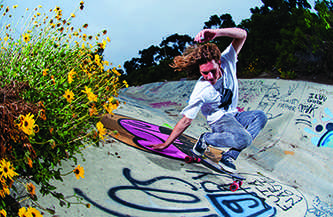
Headline: Jelly Boards bring new dimension to skateboarding
By Katlin Sweeney
Word Count: 804
What began as a hobby in high school has become the foundation upon which Sven Anders-Alwerud is finding his footing in the business world.
An avid skateboarder since the time he was 8 years old, Anders-Alwerud came up with the idea of creating a skateboard with a similar feel to riding a wave. From there, he took his idea, switched his major from chemistry to business, teamed up with some of his friends and set to work in the study rooms in Kellogg Library, creating the skateboard and designs for his future company.
Now at 23, Anders-Alwerud is enjoying the positive results that have come thus far from his first endeavor as an entrepreneur. The company, Jelly Boards, began coming together two years ago when he started collaborating with his co-founder, Cody Luke. The duo set to work creating a website, Facebook page and Instagram, developing the product, generating awareness about their business and partnering up with other businesses. As of 2012, the boards found their way into ten stores across California, notably Sun Diego.
“What’s great about the board is that it is good for a variety of conditions and terrains for different kids. We are really incorporating two worlds into one. It has the flex of a snowboard and the flow of a surfboard. So in a way, we are appealing to the three different demographics of snowboarding, surfing and skateboarding,” Anders-Alwerud said.
Besides the unique history of the product, the Jelly Board skateboard has garnered much of its attention based upon word of mouth and its appearance. The board has a clear, flexible deck, the outline of a jellyfish that expands into three circles featured on it. Because of its unique appearance, the Jelly Board attracts a lot of attention from people passing by. Anders-Alwerud uses the skateboard to get around campus, which prompts multiple conversations throughout the day about how much they like his skateboard and questions about where he purchased it. He dedicates much of his time to establish his brand among the skating community, seeing that the average skater purchases a new board once a year. In order to compete with other manufacturers, Anders-Alwerud adds that personal touch to encourage skaters to support his business.
But despite the fact that the founders are from the local area, the Jelly Board fan base extends far beyond state boarders. The skateboards have been selling across the country and around the globe to countless consumers fascinated by the unique board. The process of keeping with orders is extremely demanding, especially when you take into account how personal it is. Instead of hiring a staff to handle all of the shipments, Anders-Alwerud handles all of the orders himself to ensure that customers are happy and receive the product as quickly as possible.
“It takes about one to two and a half weeks for the whole process to come together, from producing the board to actually shipping it to the customer. If you want to be an entrepreneur, you pretty much have to wear every hat in the company. You’re overseeing everything, from product development to managing orders and networking with people,” Anders-Alwerud said.
Part of the reason shipping to so many locations is possible is because the founders do not simply rely on friends and people that see the board first-hand to spread the word. Jelly Boards also utilizes advertisements on social media to help expand their consumer base.
Advertising on Facebook has been one of the most successful routes towards expanding the amount of customers. Anders-Alwerud explained that Jelly Boards purchases an ad on Facebook, which pops up in the corner of the screen for users that search key terms like skateboarding and snowboarding. From there, the advertisement generates interest to check out the Jelly Boards Facebook page, where most transactions for the company happen. In addition to this, Jelly Boards uses Instagram to showcase the appearance of the board in various settings and with different skaters riding it.
Jelly Boards would not exist had Professor Ben Cherry and Mr. Boyer not only motivated but helped Anders-Alwerud set his plans in motion. Cherry, an entrepreneur professor at CSUSM, provided a lot of guidance and motivation as the plans for Jelly Boards came together. Boyer, an attorney, helped him with getting his corporate book finished. Anders-Alwerud also attributes his success to receiving help from people like Mitch Tenney, a VPA major that helped with the name, utilizing PhotoShop and branding.
Maintaining relationships with partners and members of the skating community is of the utmost importance to ensure that Jelly Boards keeps going.
“I’ve learned that you always need to have a back-up plan when it comes to suppliers. You need to start developing relationships and networking with people so that in case anything falls through, you have the ability to keep going,” Alwerud said.
For more information about Jelly Boards, check out jellyskateboards.com.

